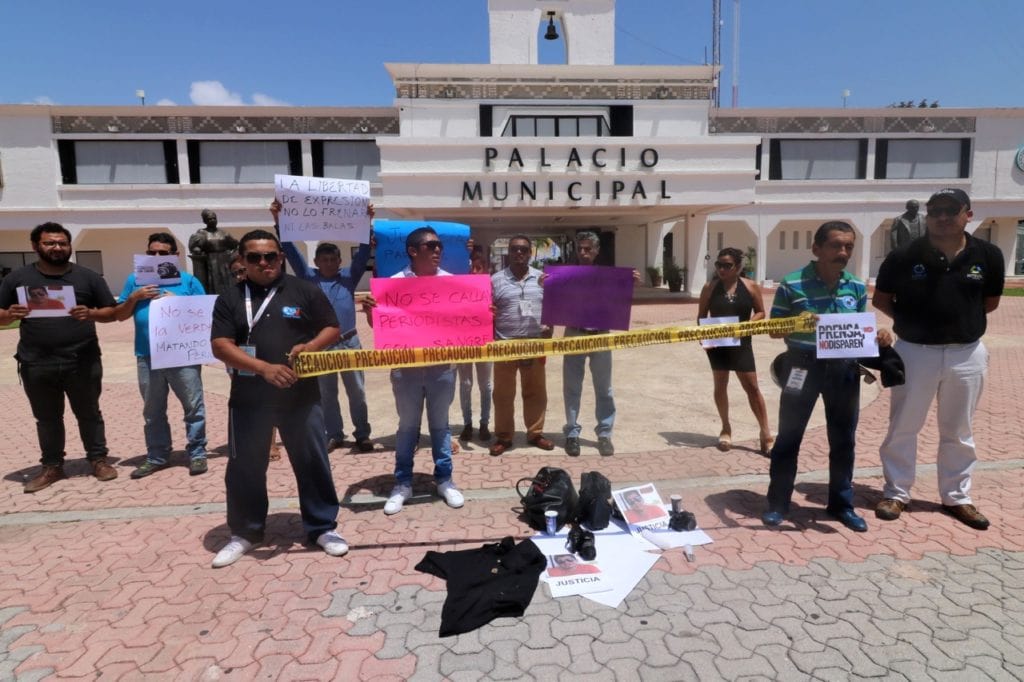May in the Americas: A roundup of key free expression news, based on IFEX member reports.
This is a translation of the original article.
Francisco Romero, who ran the Ocurrió Aquí (It happened here) digital media outlet, was shot to death on 16 May. Romero had been reporting on police affairs in the municipality of Solidaridad, in the Mexican state of Quintana Roo. With Romero’s death, a total of eight journalist assassinations have taken place in Mexico since President Manuel López Obrador took power in December 2018.
It is important to note that Romero was a beneficiary of Mexico’s protective mechanism for journalists, a government programme which has the specific goal of protecting threatened media personnel. Romero was the fourth journalist who participated in the programme to be killed since the mechanism’s inception. Additionally, Romero was the third journalist assassinated in Quintana Roo in less than a year. Previously, José Guadalupe Chan Dzib and Rubén Pat were assassinated on 29 June and 24 July 2018, respectively.
The backdrop to these murders is the widespread wave of violence taking place throughout the country. In fact, the Inter-American Commission on Human Rights (IACHR) and the Office of the United Nations High Commissioner for Human Rights (OHCHR) have expressed their concern over the climate of violence as at least 10 human rights defenders were assassinated in the first few months of 2019.
More Internet blocking and censorship
Meanwhile, in Venezuela the political and social chaos continues, and along with it detentions of journalists are ongoing. Spanish journalist Joan Guirado, who is a correspondent for the OK Diario media outlet, was expelled from the country after being detained for several hours by Bolivarian National Intelligence Service (Servicio Bolivariano de Inteligencia Nacional, SEBIN) officials in early May.
In addition, photojournalist Jesús Medina Ezaine, who has been held in detention by the SEBIN for eight months, will be brought to trial by the government. The decision to do so was met with condemnation by several international organisations, which have highlighted the arbitrary nature of Medina Ezaine’s detention
Attacks against the media and journalists have also taken place in the digital environment. The annual digital rights report published by IFEX member IPYS Venezuela revealed significant failures in connectivity in 2018, associated with damage to telecommunications infrastructure throughout the country. The report also highlighted instances of Internet blocking of a number of digital media and civil society organization websites, in addition to threats against journalists, the application of restrictive regulations and arbitrary arrests of citizens for expressing their opinions on social media sites.
Contrasting developments in Colombia
Colombia began the month on a promising note. On 6 May, a criminal court in Bogotá convicted Alejandro Cárdenas Orozco and Jesús Emiro Pereira Rivera for the kidnapping, torture and sexual assault of journalist Jineth Bedoya. The crimes against Bedoya took place when she was conducting a journalistic investigation at the La Modelo de Bogotá prison on 25 May 2000.
The conviction marks a starting point for ending impunity in the case, which has been ongoing without any effective resolution for more than 19 years.
A few days later, however, New York Times journalist Nicholas Casey left the country after being harassed on social media by members of Colombia’s Congress. Photojournalist Federico Rios, who works for the New York Times alongside Casey, also left the country after being harassed by congressional members.
Assange: a new chapter
In the United States, the Trump administration prosecuted a third whistle-blower under the controversial Espionage Act. As a result, Daniel Hale could face up to 50 years in prison if found guilty of leaking confidential information about drone warfare to the press.
And, using this same law, the US government expanded the charges against Wikileaks founder Julian Assange, who now faces an additional 17 charges over and above those that had already been levelled against him.
IFEX local member PEN America has warned that the government’s actions represent a serious threat to freedom of expression in the United States. Meanwhile, Assange has been held in detention in the United Kingdom since April of this year after the Ecuadoran authorities revoked his political asylum at Ecuador’s embassy in the UK.
Finally, two reports published by IFEX members have highlighted the delicate situations in their countries. In Bolivia, a report on freedom of expression produced by the National Press Association (Asociación Nacional de la Prensa, ANP), documented 92 cases of aggressive actions against the press, 66.3% of which were instigated by the government.
In Uruguay, IFEX member CAinfo (Centro de Archivos y Acceso a la Información) published their annual report on 3 May to commemorate World Press Freedom Day. In addition, the organisation presented research on all cases that have taken place in the country in the last five years, documenting a total of 125 threats to freedom of expression in that time period. It is worth noting, however, that, despite the significant number of cases, a year over year decrease in the number of violations was observed.
If you enjoyed this, check out all the May regional roundups!
